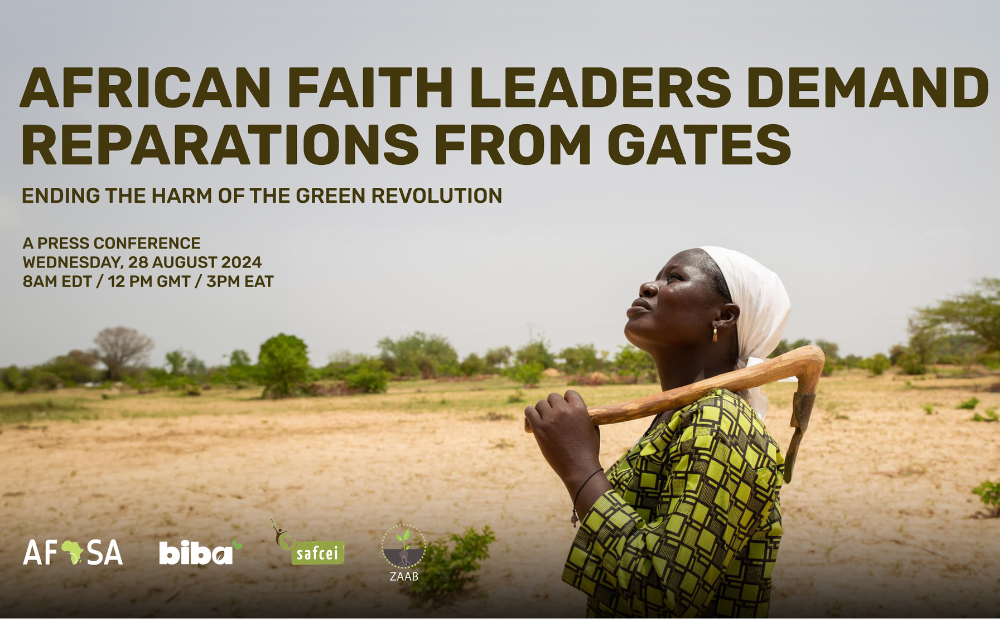Press Conference: African Faith Leaders Demand Reparations from Gates - Wednesday, 28 August 2024
- Published:

Press Conference
Wednesday, 28 August 2024
8 AM EDT | 12 PM GMT (Accra/Bamako) | 2 PM SAST (Johannesburg) | 3 PM EAT (Nairobi)
Language interpretation available in English and French
Register here: https://bit.ly/green-revolution-reparations
African faith leaders will soon issue an open letter to the Gates Foundation demanding reparations for causing extensive damage to Africa’s food systems with its aggressive push for industrialized agriculture, much of it under the banner of AGRA (formerly the Alliance for a Green Revolution in Africa). The letter, endorsed by hundreds of civil society and farmer groups, comes ahead of the African Food Systems Summit taking place from 2 - 6 September in Kigali, Rwanda, where AGRA and its allies will use the platform to further entrench agricultural models that do not align with the needs and realities of African farmers.
“The Green Revolution has not only failed to increase food security in Africa, but has also inflicted deep ecological and social wounds. As faith leaders, we have a responsibility as custodians of the Earth to call out this injustice.” — Gabriel Manyangadze, Southern African Faith Communities' Environment Institute (SAFCEI)
AGRA’s initiatives, despite receiving more than one billion dollars in funding, have only worsened the plight of smallholder farmers by increasing dependence on costly inputs, eroding local seed varieties, undermining soil fertility, and weakening farmers’ resilience to climate shocks such as drought. A recent report by The African Centre for Biodiversity (ACB) demonstrated how the “collapse” of Zambia’s food system has been partly due to adopting such Green Revolution policies.
Despite a proven track record of failures (highlighted in AGRA’s own donor-commissioned report), AGRA and its lead funders, namely the Gates Foundation and USAID, continue to push industrial agriculture using their outsized resources and power. Civil society and farmers on the ground have witnessed AGRA’s widespread influence through lobbying and exerting undue pressure on policymakers. AGRA’s political manipulation threatens to derail efforts to transition to more sustainable and locally-driven agroecological practices.
“AGRA’s fingerprints are all over African agriculture policy, and represent an attack on African farmer sovereignty.” — Million Belay, General Coordinator, AFSA
In this press conference, August 28 at 3pm EAT, farmers and community leaders will present:
- An open letter from African faith leaders, demanding that Gates Foundation provide reparations for the damage it has caused with its Green Revolution programs.
- The devastation caused by the Green Revolution agenda in Zambia, where corn production has fallen by half and hunger is severe.
- Results from new research by the Alliance for Food Sovereignty in Africa on AGRA’s extensive, undue policy influence at local, national and continental levels, which is undermining efforts to promote farmer-led ecological agriculture.
Speakers include:
- Anne Maina (moderator) – Biodiversity and Biosafety Association of Kenya
- Million Belay – General Coordinator, Alliance for Food Sovereignty in Africa (AFSA), on AGRA’s Africa-wide efforts to interfere with alternatives to the Green Revolution
- Ferdinand Wafula – Kenyan farmer, Bio Gardening Innovations, on AGRA’s efforts to undermine local agroecology initiatives
- Bishop Takalani Isaac Mufamadi – Southern African Faith Communities' Environment Institute (SAFCEI), on the faith communities’ call for just, ecological stewardship of the land
- Mary Sakala – Zambian farmer, on the urgent food crisis unfolding in Zambia
REGISTER HERE
For inquiries and sources contact: kirubel.tadele@afsafrica.org; josh@agrowingculture.org.
The Alliance for Food Sovereignty in Africa (AFSA) is Africa’s largest civil society movement, bringing together farmers, pastoralists, fishers, Indigenous, faith groups, women’s movements, youth and consumer associations in a united voice for food sovereignty on the continent. It is a network of networks operating in 50 African countries, reaching 200 million people.
Who we are

SAFCEI (Southern African Faith Communities’ Environment Institute) is a multi-faith organisation committed to supporting faith leaders and their communities in Southern Africa to increase awareness, understanding and action on eco-justice, sustainable living and climate change.
Featured Articles
-

South Africa: Who Ends Up Paying If DMRE Cooks the Price of Nuclear Power?
-

South Africa’s nuclear energy expansion plans continue to draw criticism, environmental NGOs chew over legal challenge
-

Earthlife Africa and SAFCEI respond to latest unsettling nuclear news regarding the ministerial determination
-

Open Wing Alliance Africa (Virtual) Summit 2023
-

The Green Connection and SAFCEI respond to energy minister's divisive and deflecting comments
-

Job Vacancy: FLEAT Coordinator







